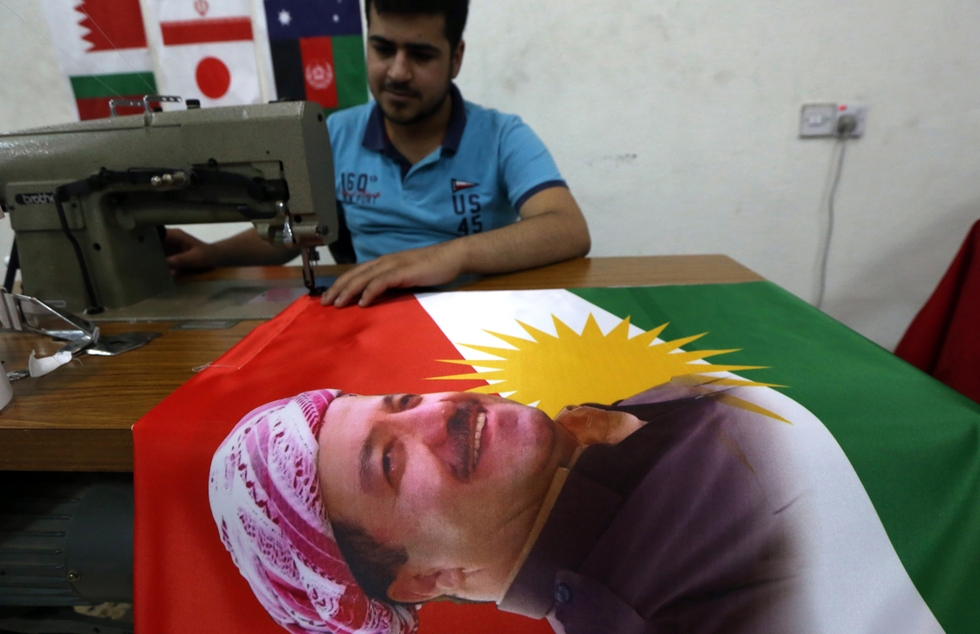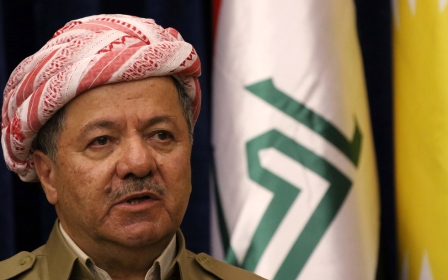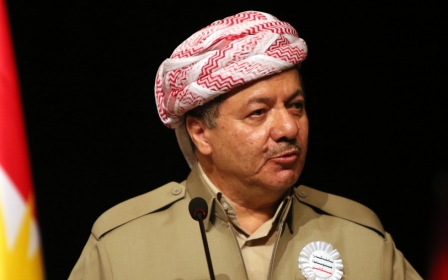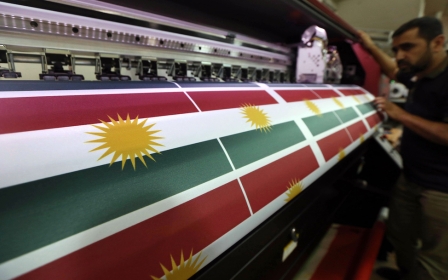The Kurdish independence poll is a KRG elite power grab

The upcoming Kurdish referendum on independence is being projected by many as the next step of a widely persecuted people in their pursuit of self-determination and security. But a closer examination shows an increasingly vicious debate that is sewing the seeds of future divisions, not unity.
In a recent interview with Foreign Policy, Iraqi Kurdish President Massoud Barzani stated: “We [the Kurds] would prefer to die of starvation than to live under the oppression and occupation of others.” But, as Kamal Chomani, a Kurdish journalist, points out: “He never starves, it’s the people who starve.” This echoes a growing sentiment among particularly young Kurds, who feel this referendum is more about shoring up Barzani’s position and personal leverage with Baghdad. The referendum is “about the future of the KDP (Kurdistan Democratic Party) and Barzani, not the Kurdish people”, adds Chomani.
Cronyism is rife in the fiefdom, and the Barzani family have used their monopoly on power to amass a fortune
Following several years of financial crisis and economic mismanagement, Erbil has racked up $30bn of debt, and the meagre salaries of public sector workers are routinely paid late. But the crunch has not been felt by all - cronyism is rife in the fiefdom, and the Barzani family have used their monopoly on power to amass a fortune while ruling over the Kurdistan Regional Government (KRG). Barzani’s son-in-law, Sirwan, is the managing director of one of Iraq’s largest telecom providers, Korek, a company worth more than $2bn. His son Masrour heads the region’s security council, while his other nephew, Nechirvan, currently serves as the KRG’s prime minister.
'A fascist state'
The government hardly resembles the “citadel of democracy and pluralism” that Barzani has promised to establish and is often portrayed in the media. In fact, the only thing it can be said to resemble is the Gulf monarchies. Chomani insists: “Barzani has never really accepted the calls for democracy, and liberalisation ... an independent Kurdistan under him would be a fascist state.” An effort to galvanise Kurds behind Barzani’s version of a Kurdish state has failed as the ramifications of corruption and financial crisis has left many reeling.
Barzani’s presidency is now entering its 12th year, and though presidential elections are scheduled for November of this year, some are sceptical he will ever leave office. Though KRG regulations stipulate his presidency should have ended in 2013, he has twice extended it by two years, once in 2013 and again in 2015.
Sheikh Jaffar, of the PUK (Patriotic Union of Kurdistan), suggested that those opposing independence were worse than Islamic State
So grave are these concerns that one member of Kurdistan’s Independent High Electoral Commission, the body charged with overseeing the referendum, resigned in late July claiming there was “no serious intent” to hold the scheduled elections. Many believe he intends to claim a need to personally oversee the independence process to lengthen his term further still.
Divisions between those staunchly in favour of Barzani’s vision and the rest are increasingly being made public, despite the announcement of the independence referendum being barely a few weeks old. Senior members of the KDP and KRG government have taken to social media declaring anyone against the independence movement a “traitor” and on the payroll of foreign governments. Though these sentiments and accusations are not limited to the KDP, Sheikh Jaffar, a member of the political bureau of the PUK (Patriotic Union of Kurdistan), suggested just this week that those opposing independence were worse than Islamic State.
'An excuse to remain in power'
This reaction goes well beyond verbal jostling on social media. Chomani, who is one of a growing number of Kurds publicly positioning themselves against September’s referendum - something that would have been unthinkable barely a few years ago - is regularly threatened both online and in the street. “People call me a traitor, they say I should be killed, all because I’m against Barzani’s referendum - that’s the reality of Kurdistan,” he said.
The 'No' campaign was further boosted last week after Kurdish businessman and owner of NRT, one of the region’s most prominent Kurdish TV stations, Shaswar Abdulwahid, announced a campaign against independence in the referendum, labelling it “an excuse by Kurdish leaders to remain in power”.
Again, he was immediately met with accusations that he was funded by Iran and close to former Iraqi prime minister Nouri Al-Maliki. If senior figures within the KRG are unable to accept opposition to the independence movement as a position of integrity, it is hard to see how an independent Kurdistan may function as the liberal democracy it so desperately tries to portray itself as.
The emotional case for an independent Kurdistan is undeniably compelling, but independence can be an extremely traumatic process
The battle against IS has also seen new tensions develop in disputed areas the Kurds have opportunistically taken control of such as Kirkuk. These areas are home to Arabs and minorities with no natural affinity to a Kurdish state, and a recovering Iraqi government is demanding their return as Iraqi sovereign territory. Only this week a speech by the KRG representative to Washington at the United States Institute of Peace was disrupted by Assyrian protesters with signs claiming “No free speech in KRG” and “KRG is not a democracy”.
The emotional case for an independent Kurdistan is undeniably compelling, but independence can be an extremely traumatic process, as has been observed in South Sudan.
That the upcoming referendum is more about President Barzani and the KRG’s elites ensuring their hold on power undermines the aspirations of some of the world’s most discriminated against people.
A growing number, particularly the young, are waking up to the fact that one family is hijacking their aspirations of becoming an independent nation, for personal gain.
The author has requested anonymity to protect his identity in Iraq
The views expressed in this article belong to the author and do not necessarily reflect the editorial policy of Middle East Eye.
Image: An Iraqi man sews a flag of Kurdistan bearing the portrait of Iraqi Kurdish leader Massoud Barzani, in Irbil, the capital of the autonomous Kurdish region of northern Iraq, on 8 June 2017 (AFP)
This article is available in French on Middle East Eye French edition.
Middle East Eye propose une couverture et une analyse indépendantes et incomparables du Moyen-Orient, de l’Afrique du Nord et d’autres régions du monde. Pour en savoir plus sur la reprise de ce contenu et les frais qui s’appliquent, veuillez remplir ce formulaire [en anglais]. Pour en savoir plus sur MEE, cliquez ici [en anglais].





